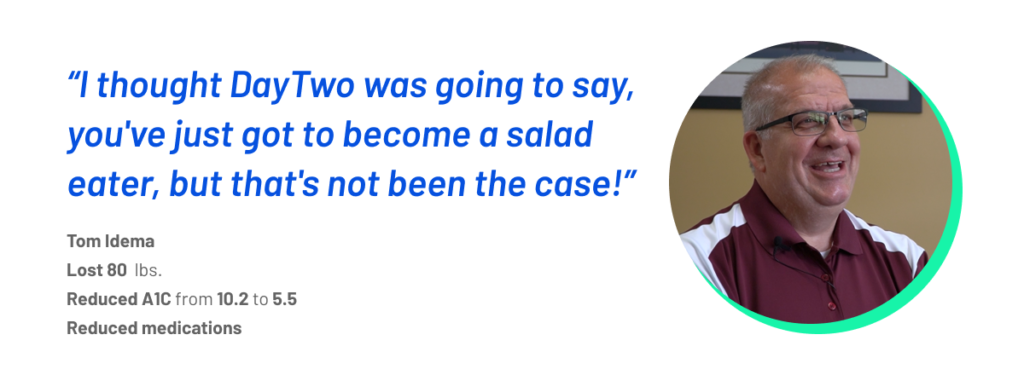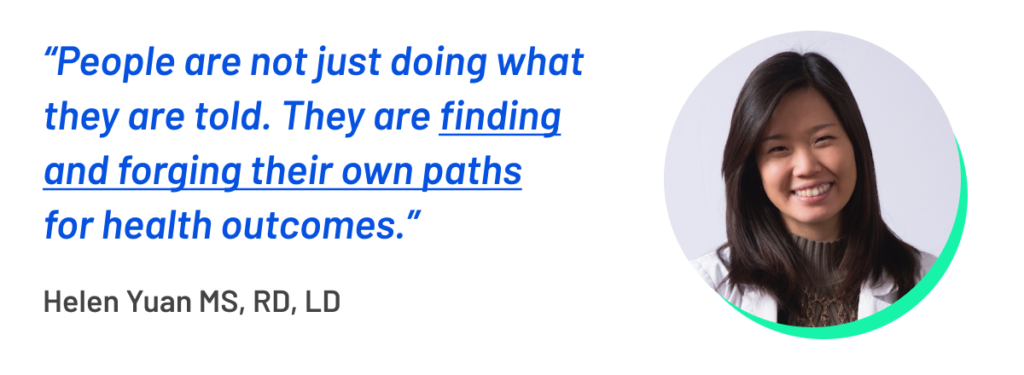
With DayTwo, The Answer is Yes. What role can an algorithm play in giving you advice about your health? Can a computer program play the part of a diabetes coach? DayTwo’s precision health solution was recently featured in a New York Times1 article exploring the role of artificial intelligence in the growing world of personalized nutrition.
In the article, author Sandeep Ravindran notes that a host of apps are offering AI-based nutrition solutions. “Instead of a traditional diet, which often has a set list of ‘good’ and ‘bad’ foods,” he writes, “these programs are more like personal assistants that help someone quickly make healthy food choices. They are based on research showing that bodies each react differently to the same foods, and the healthiest choices are likely to be unique to each individual.”
What does this personal AI assistance look like exactly? At DayTwo, our registered (human) dietitians are using the information provided by AI (developed with the world’s largest microbiome dataset) to empower people to make better decisions about which foods or food combinations will lead to fewer spikes in blood sugar. The algorithm behind the DayTwo app uses microbiome profiling to predict how each person’s blood sugar will respond to certain foods. Instead of another 1-size-fits-all fad diet, the personalization based on an individual’s microbiome enables customized food recommendations.
A Human Touch
How does this knowledge make a difference in the everyday life of someone with type 2 diabetes? As featured in the New York Times, Tom Idema had struggled to keep his diabetes under control for over 20 years. Then he was offered the DayTwo benefit through his employer, Central Michigan University. He has been on the program for over a year, putting his diabetes into remission and losing close to 100 pounds.

DayTwo’s AI empowers employees with their own body knowledge by allowing them to tap into a vast dataset — one that is uniquely theirs. It’s almost like having a dietitian in your pocket. The app is there when the dietitian is not, to help you know how any food combination will make your blood sugar respond.
As advanced as technology gets, anyone who works in HR knows: A human touch is still important. AI is not an accountability partner. While machine learning can provide excellent insights into how an employee’s blood sugar is uniquely impacted by foods, it’s the dietitian that goes the extra mile to provide personalized guidance regarding food choices, even making it culturally relevant. For example, let’s say an employee has family in town and wants to make her famous lasagna with her grandkids. On other strict diets, making lasagna might feel like she was “falling off the wagon.” A dietitian can show her how to tweak the menu in a doable way.
Personalized nutrition recommendations from AI algorithms and the personal connection of a nutritionist empowers the person with the tools they need to make lasting behavioral change– which is, of course, the struggle of any benefits program. At DayTwo, the AI combined with dietitian support enables members with the tools they need to be their own master, to creatively problem-solve their way through dinner at a restaurant.

You might think that with AI the line between what is “good” or “bad” is starkly drawn. Ask any of the DayTwo members though, and you may be surprised to learn what their dietitian told them on Day 1: No foods are “off limits.” You might ask how then does the AI come into play? The AI arms the member and dietitian with data like “bananas make my blood sugar spike,” but also that pairing them with a protein like almonds or walnuts can offset the spike and keep glucose levels in range.
When you have diabetes, it can be difficult to stay the course. Many people have issues with being told what to eat, or being told that what they like eating is not good for them. It’s no wonder they may have some success, but time and again go back to old habits. It gets frustrating. At DayTwo, having a dietitian working to first identify barriers and then help members make changes has a huge impact.
What is AI anyway?
AI utilizes computer science to sift through enormous datasets to solve a problem. AI algorithms make predictions or classifications based on input data. DayTwo’s personalized nutrition algorithm takes into account an individual’s unique microbiome analysis, food choices, and glucose levels, among many other anthropometric details. The algorithm then makes predictions about how each food or combination of foods will affect blood sugar levels.At present, AI algorithms may not be able to take into account everything that might be affecting blood sugar, including behavioral biases that can affect food choices. However, DayTwo is at the forefront of developing one of the most complex machine learning algorithms, using the world’s largest microbiome dataset of 80,000 members. We are conducting groundbreaking research to help the algorithm continually refine its accuracy.
A Partner in Health
“It’s not necessarily a matter of willpower,” says dietitian Helen Yuan. “It’s absolutely necessary for our members to have a human connection and understand that someone is listening and knows where you’re at in life. It’s knowing that your dietitian believes in you and will stick with you as a partner to support little changes that add up to big progress.”
This was certainly true for Patrick Wisniewski from Saginaw, Michigan. His A1C, an average of blood sugar measurements over 3 months, dropped from 11 to 6.2, and he lost 20 pounds. “My dietitian was instrumental in my journey through DayTwo,” he says. “She was able to listen to my frustrations if I had any, but there was always an encouraging word. And I’ll be forever grateful. ”To find out how DayTwo’s precision health program can help your employees feel and work better, visit: https://daytwo.com/employers
References:

